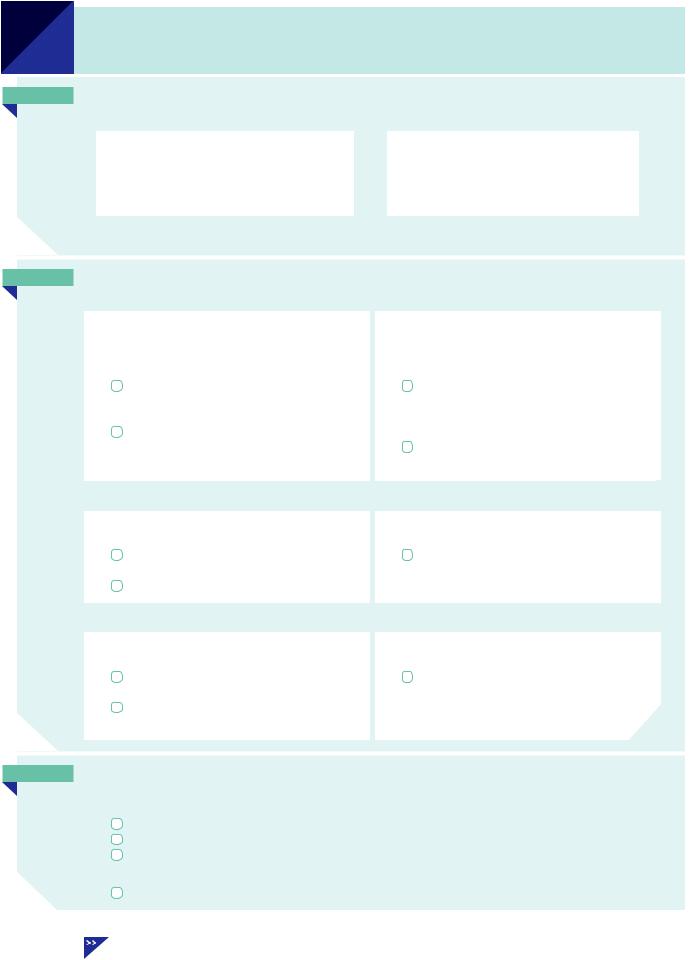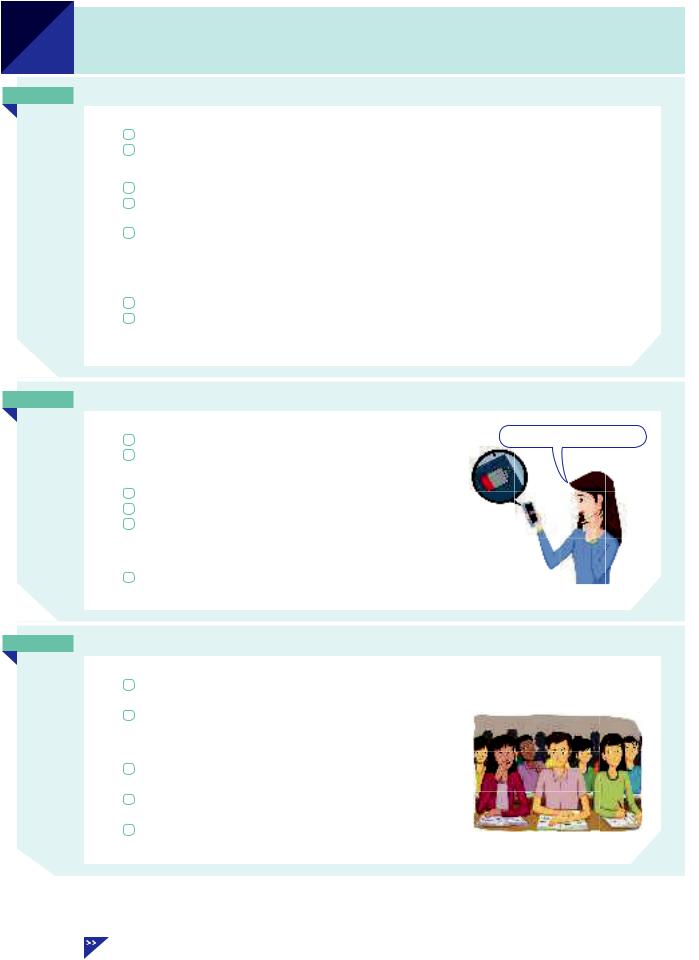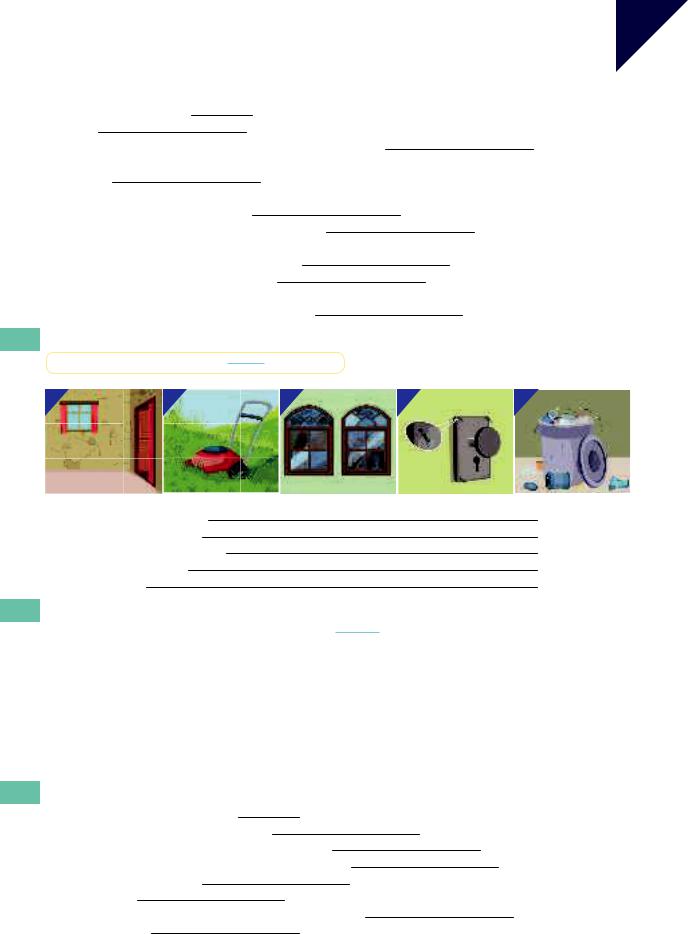
- •Contents
- •Thanks
- •To the student
- •To the teacher
- •3 Present continuous and present simple 1 (I am doing and I do)
- •10 Present perfect continuous and simple (I have been doing and I have done)
- •11 how long have you (been) … ?
- •12 for and since when … ? and how long … ?
- •13 Present perfect and past 1 (I have done and I did)
- •14 Present perfect and past 2 (I have done and I did)
- •15 Past perfect (I had done)
- •16 Past perfect continuous (I had been doing)
- •17 have and have got
- •18 used to (do)
- •19 Present tenses (I am doing / I do) for the future
- •20 I’m going to (do)
- •21 will and shall 1
- •22 will and shall 2
- •23 I will and I’m going to
- •24 will be doing and will have done
- •26 can, could and (be) able to
- •27 could (do) and could have (done)
- •28 must and can’t
- •29 may and might 1
- •30 may and might 2
- •31 have to and must
- •32 must mustn’t needn’t
- •33 should 1
- •34 should 2
- •35 I’d better … it’s time …
- •36 would
- •39 if I knew … I wish I knew …
- •40 if I had known … I wish I had known …
- •41 wish
- •42 Passive 1 (is done / was done)
- •43 Passive 2 (be done / been done / being done)
- •44 Passive 3
- •45 it is said that … he is said to … he is supposed to …
- •46 have something done
- •47 Reported speech 1 (he said that …)
- •48 Reported speech 2
- •49 Questions 1
- •52 Question tags (do you? isn’t it? etc.)
- •53 Verb + -ing (enjoy doing / stop doing etc.)
- •54 Verb + to … (decide to … / forget to … etc.)
- •55 Verb (+ object) + to … (I want you to …)
- •56 Verb + -ing or to … 1 (remember, regret etc.)
- •57 Verb + -ing or to … 2 (try, need, help)
- •58 Verb + -ing or to … 3 (like / would like etc.)
- •59 prefer and would rather
- •60 Preposition (in/for/about etc.) + -ing
- •61 be/get used to … (I’m used to …)
- •63 there’s no point in -ing, it’s worth -ing etc.
- •64 to … , for … and so that …
- •65 Adjective + to …
- •66 to … (afraid to do) and preposition + -ing (afraid of -ing)
- •67 see somebody do and see somebody doing
- •68 -ing clauses (He hurt his knee playing football.)
- •69 Countable and uncountable 1
- •70 Countable and uncountable 2
- •71 Countable nouns with a/an and some
- •74 the 2 (school / the school etc.)
- •75 the 3 (children / the children)
- •77 Names with and without the 1
- •78 Names with and without the 2
- •79 Singular and plural
- •80 Noun + noun (a bus driver / a headache)
- •81 -’s (your sister’s name) and of … (the name of the book)
- •82 myself/yourself/themselves etc.
- •83 a friend of mine my own house on my own / by myself
- •84 there … and it …
- •85 some and any
- •87 much, many, little, few, a lot, plenty
- •90 all every whole
- •91 each and every
- •92 Relative clauses 1: clauses with who/that/which
- •94 Relative clauses 3: whose/whom/where
- •95 Relative clauses 4: extra information clauses (1)
- •96 Relative clauses 5: extra information clauses (2)
- •97 -ing and -ed clauses (the woman talking to Tom, the boy injured in the accident)
- •98 Adjectives ending in -ing and -ed (boring/bored etc.)
- •99 Adjectives: a nice new house, you look tired
- •100 Adjectives and adverbs 1 (quick/quickly)
- •102 so and such
- •104 quite, pretty, rather and fairly
- •105 Comparative 1 (cheaper, more expensive etc.)
- •106 Comparative 2 (much better / any better etc.)
- •107 Comparative 3 (as … as / than)
- •108 Superlative (the longest / the most enjoyable etc.)
- •109 Word order 1: verb + object; place and time
- •110 Word order 2: adverbs with the verb
- •111 still any more yet already
- •112 even
- •114 in case
- •116 as (as I walked … / as I was … etc.)
- •117 like and as
- •119 during for while
- •121 at/on/in (time)
- •122 on time and in time at the end and in the end
- •123 in/at/on (position) 1
- •124 in/at/on (position) 2
- •125 in/at/on (position) 3
- •126 to, at, in and into
- •127 in/on/at (other uses)
- •129 Noun + preposition (reason for, cause of etc.)
- •130 Adjective + preposition 1
- •131 Adjective + preposition 2
- •132 Verb + preposition 1 to and at
- •134 Verb + preposition 3 about and of
- •135 Verb + preposition 4 of/for/from/on
- •136 Verb + preposition 5 in/into/with/to/on
- •137 Phrasal verbs 1 Introduction
- •138 Phrasal verbs 2 in/out
- •139 Phrasal verbs 3 out
- •142 Phrasal verbs 6 up/down
- •143 Phrasal verbs 7 up (1)
- •144 Phrasal verbs 8 up (2)
- •145 Phrasal verbs 9 away/back
- •Additional exercises
- •Study guide
- •Key to Exercises
- •Key to Additional exercises (see page 302)
- •Key to Study guide
- •Index

Unit
56 Verb + -ing or to … 1 (remember, regret etc.)
ASome verbs are followed by -ing and some are followed by to … .
Verbs that you can use with -ing (not to …): |
|
|
Verbs that you can use with to … : |
|
|
|||||
|
|
|
|
|
|
|
|
|
|
|
|
admit |
fancy |
postpone |
|
|
|
aford |
fail |
ofer |
|
|
avoid |
finish |
risk |
|
|
|
agree |
forget |
plan |
|
|
consider |
imagine |
stop |
|
|
|
arrange |
hope |
promise |
|
|
deny |
keep (on) |
suggest |
|
|
|
decide |
learn |
refuse |
|
|
enjoy |
mind |
|
|
|
|
deserve |
manage |
tend |
|
|
|
|
|
|
|
|
|
|
||
For examples, see Unit 53. |
|
|
|
For examples, see Unit 54. |
|
|
||||
|
|
|
|
|
|
|
|
|
|
|
|
|
|
|
|
|
|
|
|
|
|
BSome verbs can be followed by -ing or to … with a diference of meaning:
remember
I remember doing something = I did it and now I remember this.
You remember doing something ater you have done it.
I know I locked the door. I clearly remember locking it.
(= I locked it, and now I remember this) He could remember driving along the
road just before the accident, but he couldn’t remember the accident itself.
regret
I regret doing something = I did it and now I am sorry about it:
I now regret saying what I said. I shouldn’t have said it.
Do you regret not going to college?
go on
go on doing something = continue doing the same thing:
The president paused for a moment and then went on talking.
We need to change. We can’t go on living like this.
I remembered to do something =
I remembered that I had to do it, so I did it. You remember to do something before you do it.
I remembered to lock the door, but I forgot to shut the windows.
(= I remembered that I had to lock it, and so I locked it)
Remember to buy some bananas. (= Don’t forget to buy them)
I regret to say / to tell you / to inform you = I am sorry that I have to say:
(from a formal letter) I regret to say that we are unable to accept your ofer.
go on to do something = do or say something new:
Ater discussing the economy, the president went on to talk about foreign policy.
CWe use the following verbs with -ing or to … with no diference of meaning:
begin start continue intend bother
So you can say:
It started raining. or It started to rain.
Andy intends buying a house. |
or Andy intends to buy … |
Don’t bother locking the door. |
or Don’t bother to lock … |
Normally we do not use -ing ater -ing:
It’s starting to rain. (not usually It’s starting raining)
112 |
Verb + -ing Unit 53 Verb + to … Units 54–55 Other verbs + -ing or to … Units 57–58 |

Exercises
56.1 |
Put the verb into the correct form, -ing or to … . |
|
|||
1 |
They denied stealing |
the money. (steal) |
|
|
|
2 |
I don’t enjoy |
very much. (drive) |
|
||
3 |
I can’t aford |
away. I don’t have enough money. (go) |
|
||
4 |
Have you ever considered |
to live in another country? |
(go) |
||
5 |
We were unlucky to lose the game. We played well and deserved |
. (win) |
|||
6 |
Why do you keep |
me questions? Leave me alone! (ask) |
|||
7 |
Please stop |
me questions! |
(ask) |
|
|
8 |
I refuse |
any more questions. (answer) |
|
||
9 |
The driver of one of the cars admitted |
the accident. (cause) |
|||
10 |
Mark needed our help, and we promised |
what we could. (do) |
|||
11 |
I don’t mind |
alone, but I’d rather be with other people. (be) |
|||
12 |
The wall was quite high, but I managed |
over it. (climb) |
|||
13 |
Sarah doesn’t know about the meeting. I forgot |
her. (tell) |
|||
14 |
I’ve enjoyed |
to you. I hope |
you again soon. (talk, see) |
||
56.2Tom can remember some things about his childhood, but he can’t remember others. Write sentences with He remembers … or He doesn’t remember … .
Unit
56
1 |
He was in hospital when he was a small child. He can still remember this. |
|
|
He remembers being in hospital |
when he was a small child. |
2 |
He cried on his first day at school. He doesn’t remember this. |
|
|
He doesn’t |
on his first day at school. |
3 |
Once he fell into the river. He remembers this. |
|
|
He |
. |
4 |
He said he wanted to be a doctor. He doesn’t remember this. |
|
|
|
to be a doctor. |
5 |
Once he was bitten by a dog. He doesn’t remember this. |
|
|
|
a dog. |
6 |
His sister was born when he was four. He remembers this. |
|
|
|
. |
56.3 Complete the sentences with a suitable verb in the correct form, -ing or to … .
1 |
a |
Please remember to lock the door when you go out. |
|
|
|
|
b |
He says we’ve met before, but I don’t remember |
him. |
|
|
|
c |
Someone must have taken my bag. I clearly remember |
it by the |
|
|
|
|
window and now it isn’t there. |
|
|
|
|
d When you see Steve, remember |
hello to him from me. |
|
||
|
e |
a: You lent me some money a few months ago. |
|
|
|
|
|
b: Did I? Are you sure? I don’t remember |
you any money. |
|
|
|
f |
a: Did you remember |
your sister? |
|
|
|
|
b: No, I forgot. I’ll phone her tomorrow. |
|
|
|
2 |
a |
The course I did wasn’t very good, but I don’t regret |
it. |
|
|
|
b |
I knew they were in trouble, but I regret |
I did nothing to help them. |
|
|
|
c |
It started to get cold, and he regretted not |
his coat. |
|
|
|
d |
I now regret |
my job. It was a big mistake. |
|
|
3 |
a |
Ben joined the company nine years ago. He became assistant manager ater two |
|
||
|
|
years, and a few years later he went on |
manager of the company. |
|
|
|
b I can’t go on |
here any more. I want a diferent job. |
|
||
|
c |
When I came into the room, Lisa was reading a book. She looked up and said hello, |
|
||
|
|
and then went on |
her book. |
|
|
|
d Food prices have gone up again. How are we going to manage if prices go on |
? |
|||
Additional exercises 26–28 (pages 317–19) |
113 |

Unit
57 Verb + -ing or to … 2 (try, need, help)
Atry to … and try -ing
try to do = attempt to do, make an ef ort to do:
I was very tired. I tried to keep my eyes open, but I couldn’t.
Please try to be quiet when you come home. Everyone will be asleep.
try something or try doing something = do it as an experiment or test:
These cakes are delicious. You should try one. (= have one to see if you like it)
We couldn’t find anywhere to stay. We tried every hotel in the town, but they were all full. (= we went to every hotel to see if they had a room)
a: The photocopier doesn’t seem to be working.
b:Try pressing the green button.
(= press the green button – perhaps this will help to solve the problem)
Compare:
I tried to move the table, but it was too heavy. (so I couldn’t move it)
I didn’t like the way the furniture was arranged, so I tried moving the table to the other side of the room. But it didn’t look right, so I moved it back again.
(I tried moving it = I moved it to see if it looked better)
Bneed to … and need -ing
I need to do something = it is necessary for me to do it:
|
He needs to work harder if he wants to make progress. |
My phone needs charging. |
|
|
|
|
I don’t need to come to the meeting, do I? |
|
You can say that something needs -ing: |
|
|
|
My phone needs charging. (= it needs to be charged) |
|
|
Does your suit need cleaning? (= … need to be cleaned) |
|
|
It’s a dif icult problem. It needs thinking about carefully. |
|
|
(= it needs to be thought about carefully) |
|
Compare: |
|
|
|
I need to charge my phone. |
|
but |
My phone needs charging. |
|
Chelp and can’t help
You can say help to do or help do (with or without to):
Everybody helped to clean up at er the party. or
Everybody helped clean up …
Can you help me move this table? or
Can you help me to move …
I can’t help doing something = I can’t stop myself doing it: |
|
I don’t like him, but he has a lot of problems. |
|
I can’t help feeling sorry for him. |
|
She tried to be serious, but she couldn’t help laughing. |
|
(= she couldn’t stop herself laughing) |
|
I’m sorry I’m so nervous. I can’t help it. |
|
(= I can’t help being nervous) |
She couldn’t help laughing. |
114 |
Verb + -ing Unit 53 Verb + to … Units 54–55 Other verbs + -ing or to … Units 56, 58 |

Exercises |
|
|
Unit |
||
|
|
57 |
|||
|
|
|
|
||
|
|
|
|||
57.1 |
Put the verb into the correct form. |
|
|
||
1 |
I was very tired. I tried to keep |
my eyes open, but I couldn’t. (keep) |
|||
2 |
I tried |
the shelf, but I wasn’t tall enough. (reach) |
|||
3 |
I rang the doorbell, but there was no answer. Then I tried |
on the window, |
|||
|
|
but there was still no answer. (knock) |
|
|
|
4 |
We tried |
the fire out, but without success. We had to call the fire |
|||
|
|
brigade. (put) |
|
|
|
5 |
Please leave me alone. I’m trying |
|
. (concentrate) |
||
6 |
Sue needed to borrow some money. She tried |
Carl, but he didn’t have |
|||
|
|
any. (ask) |
|
|
|
7 |
Mr Bennett isn’t here right now. Please try |
later. (call) |
|||
8 |
The woman’s face was familiar. I tried |
where I’d seen her before. |
|||
|
|
(remember) |
|
|
|
9 |
If you have a problem with the computer, try |
it. (restart) |
|||
57.2 For each picture, write a sentence with need(s) + one of the following verbs:
clean |
cut |
empty |
paint |
|
tighten |
|
|
|
|
|
|
|
|
|
|
1 |
|
2 |
|
3 |
|
4 |
5 |
|
|
|
|
|
|
|
|
1 |
This room isn’t very nice. It needs painting |
. |
2 |
The grass is very long. It |
. |
3 |
The windows are dirty. They |
. |
4 |
The screws are loose. |
. |
5 |
The bin is full. |
. |
57.3 Which is right?
1We spend too much time sitting down. We need getting / to get more exercise. (to get is correct)
2 These clothes are dirty. They all need washing / to wash.
3 My grandmother isn’t able to look at er herself any more. She needs looking / to look at er. 4 I can’t make a decision right now. I need thinking / to think about it.
5 Your hair is getting very long. It will need cutting / to cut soon. 6 I need a change. I need going / to go away for a while.
7 That shirt looks fine. You don’t need ironing / to iron it.
8 That shirt looks fine. It doesn’t need ironing / to iron.
57.4Put the verb into the correct form.
1 |
I don’t like him, but I can’t help feeling |
sorry for him. (feel) |
|
2 |
I’ve lost my phone. Can you help me |
for it? |
(look) |
3 |
They were talking very loudly. We couldn’t help |
what they said. (overhear) |
|
4 |
He looks so funny. Whenever I see him, I can’t help |
. (smile) |
|
5 |
The fine weather helped |
it a really nice holiday. (make) |
|
6 |
Did you help |
the meeting? (organise) |
|
7 |
I think about what happened all the time. I can’t help |
about it. (think) |
|
8 |
I can’t help you |
a job. You have to find one yourself. (get) |
|
115
